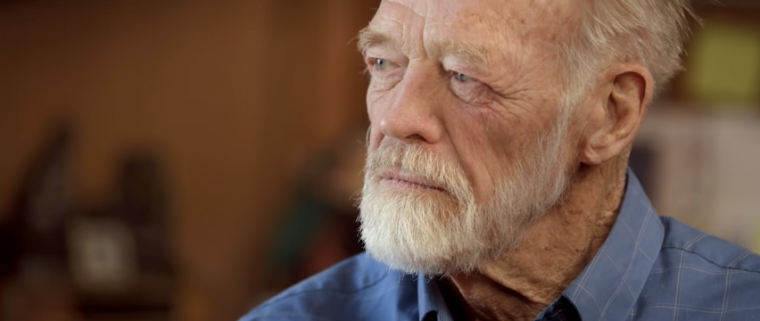Hero or heretic? 6 lessons from the Christian outrage circus over Eugene Peterson
Life moves pretty fast on Christian evangelical Twitter.
On Wednesday, renowned author and theologian Eugene Peterson was caught in controversy after he was revealed to have apparently 'changed his mind' on same-sex marriage, now endorsing it.

There was a range of fiery reactions, from delighted celebration to fierce condemnation – from predictable parts of the Christian evangelical world, with Christian retailer LifeWay threatening to destock his books if his new position was confirmed.
Then later on Thursday, the news broke that Peterson had changed his mind – again. He backtracked on his prior comments and affirmed, somewhat curiously, 'a biblical view of everything'. He now unambiguously endorsed the traditional Church line on marriage as 'one man to one woman'.
Suddenly everyone was a little confused. What had happened? Was he misunderstood, confused himself – or was he pressured to recant? The fiery reactions generated now looked rather silly.
This theological theatre should prompt Christians online to take a breath and reflect. We've all got a lot of growing up to do. So here are six lessons from a bizarre drama that told us little about Peterson, but a lot about the Church.
1. Too quick to speak
Moments after Peterson's first comments were published, a deluge of dramatic responses hit the internet. Progressives praised, while conservatives tutted or condemned, calling the move 'unsurprising', 'disappointing', or rushing to explain why the biblical scholar why was completely wrong. Other users went further, accusing him of 'apostasy', and being a 'false teacher' selling out to culture. Some promised to burn his books. Response essays and blogs were rushed out, including one by me. And then of course all the chatter was mostly redundant once Peterson backtracked.
Now, admittedly, Peterson's first comments, though odd, were not that unambiguous – he strongly suggested a change of position and gave some kind of accompanying explanation. To want to react is understandable. But for whatever reason, he retracted. Those intense, personal and self-righteous reactions suddenly had nowhere to go.
Proverbs 29:30 warns 'Do you see someone who speaks in haste? There is more hope for a fool than for them.'
We don't have to talk all the time. Sometimes we can just breathe, and wait.
2. Idol-obsessed
The Church is also still driven by a focus on famous figures – icons to rally behind or against. I get that communities naturally form leaders and those can be good, but for one retired pastor to have generated so much heated chatter seems deeply unhealthy. I'm sure Peterson doesn't welcome it. Christian media headlines are regularly dominated by celebrity pastors 'speaking out' and people lap it up.
Peterson is a serious, influential scholar who wrote his own translation of the Bible – his name, and his thoughts on this issue matter. But the idea that one man's curious comments could or should 'tip the scales' in a huge Church debate is silly and dangerous. It might not be inaccurate, but it's not something to be proud of.
3. The heretic hunt goes on
The judgment that poured out on Peterson when his pro-LGBT comments had put him 'outside' of Orthodoxy smacked of a heresy-hunt, an obsession with who is 'in' or 'out' – the dividing line for which is all too often one's view on gay marriage. It almost felt like people delighted in this strange kind of gatekeeping, somberly asking 'Should we still read his books'?
Conservatives were then all too happy to welcome Peterson back again once he recanted. The contrast was jarring, and not pretty. It looks like a shallow kind of 'unity' to enjoy.
4. Cruel Christianity
Liberals were predicting conservative condemnations before they happened, and conservatives were all too happy to oblige. There was, no generosity of spirit, but rather on both sides a flurry of smugness, cynicism and antagonism that ignores the human beings behind these debates. Christianity has done this in the past, and will probably continue in it – but it doesn't have to. Change is possible, real, transcendent love, even of those we see as 'enemies', is possible, especially when they're actually brothers and sisters. We just might need to step away from the screen.
5. Publishers are powerful
LifeWay's threat to de-stock Peterson's vast catalogue of books, including The Message translation of the Bible, has led some to conclude they were the strong-arming power provoking Peterson's backtrack. There's no evidence for this, but even the suspicion shows the control that one shibboleth has in today's Church. The intense divides suggest we're actually at war.
6. Twitter generates much heat, but little light
'Everyone should be quick to listen, slow to speak and slow to become angry, because human anger does not produce the righteousness that God desires,' says James 1:19-20. If only we could inhabit this ideal online.
Twitter, and Facebook to a lesser extent, are inherently adversarial. They are not wise platforms for healthy, loving debate because they encourage caricature and misunderstanding. They promote polarisation and we know it, but don't do much about it.
Snarky quote-tweets and snappy 'gotchas' abound. Unhelpful rhetorical questions and sarcastic memes don't exactly help. Twitter can occasionally promote wise discussion, listening and insight. But not when #EugenePeterson is trending, and everyone's too focused on taking their righteous stand.
Perhaps we should all ask if we need a break from Twitter or social media. It might sound hard, but stepping outside the chamber of social media's self-perpetuating outrage circus could actually be good for your soul. A Church can dream, anyway.
You can follow @JosephHartropp on Twitter











